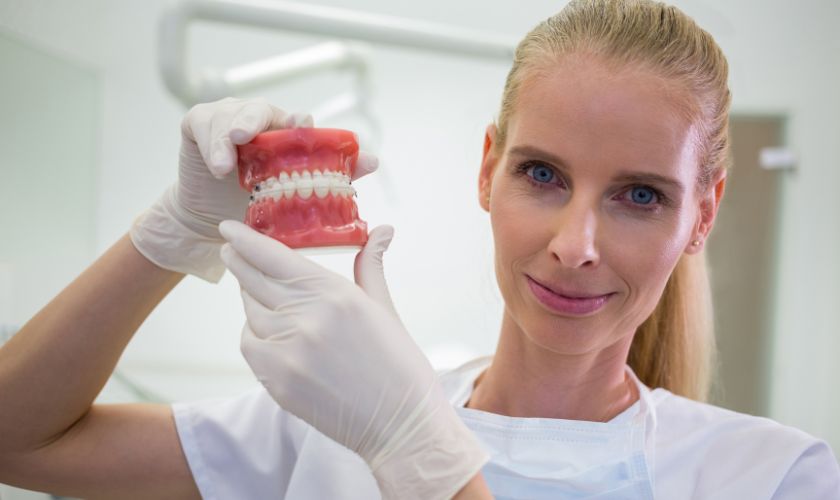Dentures are the perfect solution for resolving missing teeth and giving you a great smile. But just like your natural teeth, they require proper care and maintenance to function optimally. One of the common issues faced by denture wearers is relining problems that could cause discomfort or even embarrassing moments. Fear not, though! Our experts have compiled an essential guide to help you identify and solve the top 7 denture reline problems that may be preventing you from enjoying life to its fullest with your false pearly whites. Read on to discover how easy it is to keep your dentures secure, comfortable, and free from any trouble!
If you have ever had a denture, you know that they are not the most comfortable thing in the world. They can rub on your gums, cause sore spots, and generally be a pain. That’s where denture relines comes in.
Denture reline is a process where the inside of your denture is fitted with a new, softer material that will help it to better grip your gums and stay in place. This can be a great solution for people who have trouble keeping their dentures in, or who find them uncomfortable.
Problem 1: Poor Fit
If your dentures don’t fit well, it can be incredibly frustrating. You may find that your dentures slip and slide, making it difficult to eat or speak. In some cases, poor-fitting dentures can even cause pain.
There are a few reasons why your dentures might not fit properly. It could be that your mouth has changed shape since you first got your dentures, or that the dentures themselves have become worn down over time. Whatever the reason, there are a few things you can do to try to improve the fit of your dentures.
First, you can try relining your dentures. This process involves adding new material to the inside of the denture to create a better fit. It’s important to note that relining is only a temporary solution, and you may need to do it multiple times over the years as your mouth changes shape.
Another option is to get new dentures made. This may be a more expensive option, but if your old dentures are in bad shape or just don’t fit well anymore, it may be worth it in the long run.
Whatever route you decide to go, make sure you consult with a qualified dentist who can help you find the best solution for your individual needs.
Problem 2: Uncomfortable Pressure Points or Irritation
If your dentures are causing uncomfortable pressure points or irritation, it is likely that they need to be relined. When dentures no longer fit properly, they can rub against the gums and cause pain. If you have noticed any discomfort when wearing your dentures, make an appointment with your dentist to have them examined.
Problem 3: Difficulty with Chewing and Eating
If you have problems chewing or eating with your dentures, it could be due to a few different things. First, your dentures may not fit correctly. This can be easily fixed with a reline. Second, you may have developed gum disease since getting your dentures. This can also be fixed with a reline or by seeing a Periodontist for treatment. Third, you may simply need to practice chewing and eating with your dentures. It takes a little bit of time to get used to them. Try soft foods at first and cut your food into small pieces.
Problem 4: Gagging Sensitivity
If you have a gag reflex, you may have trouble with dentures. The increased sensitivity can make it difficult to keep the dentures in place. There are a few things you can do to help reduce the gag reflex:
-Use a numbing cream before inserting the dentures. This will help to reduce any irritation.
-Try different brands or types of denture adhesive. Some are more effective than others.
-Change the way you insert the dentures. Try holding them in place for a few seconds before biting down.
-Talk to your dentist about other options, such as implants or mini-implants, which can provide more stability for the denture and reduce gagging.
Problem 5: Bad Taste
If you’re experiencing a constant bad taste in your mouth, it could be due to your denture reline. When denture relines are not done properly, food and bacteria can become trapped under the reline material, causing a foul odor. If you think your bad taste is due to your denture reline, try soaking your dentures in a denture cleaning solution overnight. You can also use a soft toothbrush to gently scrub any areas that seem to be affected by the bad taste. If the problem persists, contact your dentist to have your denture reline redone.
Problem 6: Speech Difficulties
If you have dentures, you may have experienced difficulties with your speech. This is a common problem that can be caused by a number of factors, including the fit of your dentures, the type of denture material, and your own mouth anatomy.
There are a few things you can do to help improve your speech with dentures:
– Make sure your dentures fit well. If they are loose, they can cause you to mumble or slur your words. Visit your dentist regularly to have them checked and adjusted as needed.
– Practice reading aloud. This will help you get used to the feeling of wearing dentures and make it easier to speak clearly.
– Use dental adhesive. This can help secure your dentures in place and prevent them from moving around when you talk. Be sure to follow the manufacturer’s instructions for use.
With a little practice and patience, you can overcome any difficulty speaking with dentures. If you have persistent problems, consult with your dentist to find the best solution for you.
Problem 7: Jawbone Deterioration and Loss of Support
If the bones supporting your denture deteriorate, it can cause the fit of your denture to change and become loose. This can lead to unsatisfactory chewing, as well as clicking or popping sounds when you talk. In addition, jawbone deterioration can cause your facial muscles to sag, giving you an older appearance.
To help prevent jawbone deterioration, it is important to clean your dentures daily and avoid chewing hard foods. You should also see your dentist regularly for checkups and dental cleaning. If you experience any changes in the fit of your denture, please contact us so that we can make the necessary adjustments.
Solutions to Common Denture Reline Problems
If you wear dentures, you may eventually experience one or more common reline problems. Fortunately, there are solutions to these problems. Here are some of the most common dentures reline problems and their solutions:
1. If your denture adhesive isn’t working as well as it used to, try using a different brand or type of adhesive. You may also need to increase the amount of adhesive you use, or apply it more frequently.
2. If your denture base is too thick, it can cause the fit to be loose and uncomfortable. In this case, you’ll need to have your dentures professionally relined or replaced.
3. Loose teeth can be caused by anything from bite changes to bone loss. In most cases, loose teeth can be fixed with dental implants or by getting new dentures made.
4. Poorly fitting dentures can be uncomfortable and make it difficult to eat and speak properly. If your dentures don’t fit right, you’ll need to have them professionally relined or replaced.
Conclusion
Denture relines can be an effective way to customize and renew clinical dentures, but they come with their challenges. Before undergoing a procedure like this, it’s important that you’re aware of the most common issues you might encounter so that you know how to handle them or prevent them in the first place. With our list of top 7 problems associated with denture relines, we hope we’ve been able to equip readers with the knowledge they need to make informed decisions about their care and treatment plans.
FAQs
What is a denture reline and its types?
Denture reline is a common dental procedure in which the fit of a denture is adjusted or “relined” to better conform to the contours of the gums. This can be necessary due to changes in the shape of the gums over time, due to weight loss or gain, or simply because the original fit was not ideal.
There are two main types of denture reline: soft reline and hard reline
A soft reline involves adding a pliable material to the inside surface of the denture, which molds to the contours of the gums for a snug fit. A hard reline, on the other hand, replaces the entire inside surface of the denture with a harder material that does not mold to the gums but still provides a good fit.
Most people who need a denture reline can choose between a soft or hard reline, although in some cases only one type may be suitable. Your dentist will be able to advise you on which type of reline is best for your individual needs.


